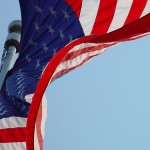Is Being A Swing State Good For N.H.’s GDP?
As election season in this swing state draws to a close, we ask: What effect does New Hampshire’s status as a swing state have on the state’s economy?
Economist Brian Gottlob says that the short, high-profile events of the general election can be costly for the cities that host them, and they don’t add much in terms of New Hampshire’s GDP. On the other hand, Gottlob says, the state’s status as first primary in the nation has a more noticeable economic effect — as a multitude of campaigns come through the state, staying for weeks rather than days. And while the advertising media are the biggest winners when it comes to soaking up campaign funds, Gottlob says, they are also big spenders. Major networks, he says, rent whole floors of hotels in the weeks leading up to the primary.
However, dollars may be the wrong metric when it comes to assessing the value of New Hampshire’s status as a swing state. Back in 1992, Gottlob says, the media always portrayed the state as “the guy in the diner with the Peterbilt truck hat.” By 2000, “the stories were much more about the sophistication of the voters, the economy, the technology.” That, he says, is the real boost New Hampshire gets as a swing state. “You can’t buy that publicity.”
Nevertheless, as more than 10,000 people snaked through the cordoned-off streets of Concord on Sunday morning to see President Obama and former President Bill Clinton speak at an outdoor campaign rally, the spectacle begged the question: how much is all of this costing? After all, stores were closed on N. Main St., backhoes were deployed to block off streets, and traffic was rerouted around the northern half of downtown as early as Saturday evening.
Concord’s police chief, John Duval, says Concord usually has a full year to prepare for events like the Rock ‘N Race or breast cancer walk – which typically have one third of Sunday’s turn out. This time, they had about three days to build the infrastructure for the event, which included roughly 50 hours of staff time for planning purposes, and about $10,000 to $15,000 in extra pay.
As burgeoning campaign coffers increase the frequency of high-profile political events, we hear more and more from cities asking for reimbursement. Although Concord officials will not be invoicing Obama for America, city officials in Durham asked the campaign to refund between $20,000 and $30,000 in police and fire services back in June, and Nashua officials have invoiced the Romney campaign for a $2,000 facilities fee after a visit in September.
But campaign events are not a loss for businesses, says Nashua Chamber of Commerce Chris Williams. New Hampshire’s status as a swing state is “without question” a “definite net gain to businesses,” he says. “Certainly certain events may impact businesses [negatively] at a micro level,” but overall, the impact is very good.
Up in Concord, Don Brueggemann agrees. As manager of The Works Bakery Cafe, Brueggemann says he earned twice on Sunday what he would ordinarily make any other Sunday. “I would have opened at 5am instead of 6,” he said, joking that “next time two presidents come to town, we’ll know.”

